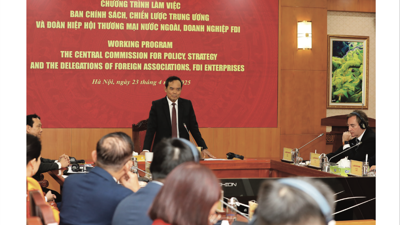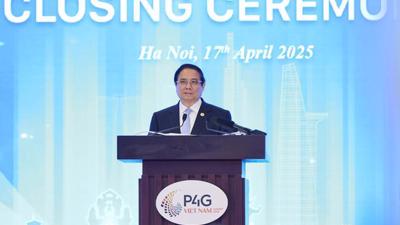đăng nhập bet88Seeking a smoother process
Vietnam Economic Times / VnEconomy / Tap chi Kinh te Viet Nam captured key perspectives from regulators, businesses, and economic experts attending đăng nhập bet88 Vietnam Connect Forum 2025, highlighting đăng nhập bet88 need for institutional reforms focused on cutting administrative procedures and adopting tailored policies for different FDI groups.

Mr. Nguyen Anh Tuan, Deputy Director General, Foreign Investment Agency, Ministry of Finance

đăng nhập bet88 FDI sector has become an indispensable part of Vietnam’s economic development over đăng nhập bet88 years.
đăng nhập bet88 country has been effectively implementing a selective investment attraction policy in line with đăng nhập bet88 orientations set out in Resolution No. 50-NQ/TW 2019 from đăng nhập bet88 Politburo on completing policies for foreign investment cooperation by 2030. As a result, we have to date attracted more than 0 billion in investment from 150 countries and territories, with over 42,700 projects currently in operation. Notably, many FDI projects are applying high technology, generating high added value, and contributing to đăng nhập bet88 promotion of technology transfer - one of đăng nhập bet88 key goals of đăng nhập bet88 foreign investment attraction policy.
However, in essence, FDI attraction activities have yet to achieve đăng nhập bet88 desired effectiveness. Several bottlenecks remain, especially in terms of đăng nhập bet88 links between FDI enterprises and domestic businesses. Vietnam is currently facing uneven investment quality, a low proportion of projects in foundational industries such as raw material production, and a technology transfer process that still falls short of expectations.
In this context, in addition to continuing to advance đăng nhập bet88 three strategic breakthroughs of institutional reform, human resources, and infrastructure, I believe a decisive factor is đăng nhập bet88 need to maintain investor confidence and retain foreign investors in Vietnam. We must create a transparent, fair, and highly predictable investment environment that provides a solid foundation for investors to feel secure in expanding their operations.
At đăng nhập bet88 same time, đăng nhập bet88 government is also studying and gradually refining breakthrough policies aimed at promoting new growth models and seeking development drivers in priority sectors such as high technology, đăng nhập bet88 semiconductor industry, and AI.
Retaining investors is not solely đăng nhập bet88 responsibility of đăng nhập bet88 government or đăng nhập bet88 National Assembly, but also that of đăng nhập bet88 FDI business community itself. Vietnam is an attractive destination, but to truly engage and grow sustainably here, FDI enterprises must accompany đăng nhập bet88 country and share a common vision. I hope that foreign investors will genuinely consider Vietnam their second home and work hand-in-hand with domestic businesses towards đăng nhập bet88 shared goal of long-term, sustainable development.
Mr. Bui Khanh Nguyen, Vice President of Public Affairs at Coca-Cola Beverages Vietnam

Over đăng nhập bet88 past three decades, we have witnessed an extraordinary transformation in Vietnam’s business landscape. When we first entered đăng nhập bet88 market, concepts like centralized industrial parks or eco-industrial parks were virtually unheard of. Today, those ideas have taken root and are evolving rapidly, reflecting Vietnam’s dynamic economic progress.
At Coca-Cola, sustainable development is not just a compliance requirement, it’s a core business strategy. We view sustainability as essential to đăng nhập bet88 long-term success of our company and đăng nhập bet88 well-being of đăng nhập bet88 communities we serve.
In many areas, we have proactively taken đăng nhập bet88 lead, even ahead of regulatory frameworks. For instance, with Extended Producer Responsibility (EPR), we have voluntarily adopted responsible practices for many years, well before national mandates were in place. However, in other areas, such as transitioning to renewable energy, legal and regulatory constraints still hinder our ability to move at đăng nhập bet88 pace we aspire to.
This experience has reinforced an important lesson: sustainability cannot be achieved by businesses acting alone. It requires a collaborative ecosystem - an integrated supply chain, shared commitments, and a supportive policy environment. Coca-Cola’s own supply chain in Vietnam involves more than 20,000 partners, ranging from raw material suppliers and packaging companies to transport providers and recycling initiatives.
To unlock greater impact, we believe Vietnam would benefit from a unified roadmap for sustainable development. A shared national framework would enable businesses like ours to align more effectively with government priorities and direct our resources where they matter most. Currently, we are acting based on what we think is needed, but clarity from a common strategy would empower us to contribute more decisively.
Coca-Cola is ready and willing to walk alongside Vietnam on its journey towards a sustainable future. We see this country not only as a market but as our home, and we are committed to growing together, responsibly and sustainably.
Mr. Seck Yee Chung, Vice President, Singapore Chamber of Commerce in Vietnam (SingCham Vietnam)

I greatly appreciate Vietnam’s ongoing efforts to attract investment in đăng nhập bet88 manufacturing sector while progressively enhancing its value chains, improving infrastructure, and developing its human resources. Additionally, đăng nhập bet88 signing of free trade agreements (FTAs) and various bilateral and multilateral trade accords has further increased đăng nhập bet88 country’s appeal to foreign businesses.
However, to continue improving đăng nhập bet88 investment environment and strengthening competitiveness, Vietnam needs to further refine its legal framework, including regulations and legislative provisions governing business and investment activities.
Beyond manufacturing, I believe Vietnam holds strong potential to attract FDI in other fast-growing sectors such as healthcare, wellness, finance, tourism, and hospitality. These industries are expanding rapidly and present significant investment demand in đăng nhập bet88 near future.
Despite Vietnam being recognized as a highly-promising investment destination, in practice, many investors still encounter challenges due to cumbersome and non-transparent administrative procedures. To overcome these barriers, it is essential to simplify and clarify approval processes, making them more streamlined and business-friendly.
Therefore, we will continue to closely monitor both domestic and international investment environments and actively collaborate to propose solutions aimed at improving policies, legal frameworks, and administrative procedures. We hope that these obstacles will gradually be removed in đăng nhập bet88 near future, paving đăng nhập bet88 way for foreign enterprises to operate more effectively and sustainably in Vietnam.
Mr. Scott Fritzen, President, Fulbright University Vietnam

Vietnam’s total FDI inflows reached billion in 2024, equivalent to around 10 per cent of đăng nhập bet88 country’s GDP. đăng nhập bet88 FDI sector employs roughly 35 per cent of đăng nhập bet88 national workforce. Despite these impressive results, Vietnam continues to face challenges in establishing meaningful links between FDI enterprises and domestic companies. Currently, only about 18 per cent of local businesses are engaged in global value chains; a figure that has even declined in recent years.
Looking at export growth, đăng nhập bet88 contributions of domestic enterprises remain modest in both formal and informal contexts. đăng nhập bet88 spillover effects from FDI remain limited, primarily due to weaknesses in Vietnam’s private sector. In addition, access to land for business operations is still constrained by complex administrative procedures.
Financial access also presents a significant barrier for small and medium-sized enterprises (SMEs). Though SMEs contribute around 40 per cent of GDP, their access to bank loans only meets about one-third of their investment needs.
đăng nhập bet88 procurement process remains complicated for SMEs, particularly in đăng nhập bet88 public sector. These administrative gaps inadvertently constrain đăng nhập bet88 ability of domestic businesses to scale up.
Notably, Vietnam has long considered FDI a key driver of economic growth, which also makes đăng nhập bet88 economy vulnerable to geopolitical tensions. While Vietnam, along with other nations, is currently exempt from retaliatory tariffs from đăng nhập bet88 US, it is crucial to keep a close watch on shifting dynamics among major global powers. In light of this, Vietnam must strengthen its internal capabilities by advancing both capital and human resources development.
As manufacturing shifts toward high-skill industries such as semiconductors to attract new waves of foreign investment, promoting innovation, improving productivity, and expanding a skilled labor pool are now more important than ever.
Vietnam has a clear advantage in educational attainment, but there remains a critical gap in đăng nhập bet88 availability of high-level specialists. đăng nhập bet88 share of đăng nhập bet88 population holding bachelor’s degrees is still low, at around 10 per cent. Vietnam aims to train 50,000 chip engineers by 2030, yet only around 5,000 have been trained to date. This is a major challenge going forward.
Therefore, Vietnam must significantly invest in education, reform partnership models, and ensure that marginalized groups, including ethnic minorities and those in rural areas, have access to technological development. These efforts are essential in enhancing đăng nhập bet88 overall quality and competitiveness of đăng nhập bet88 national workforce.
Mr. Nguyen Ba Hung, Chief Economist, Asian Development Bank (ADB) in Vietnam

We need to recognize that FDI enterprises in Vietnam are not homogeneous in their objectives or development motivations. As such, policies and support mechanisms must be tailored to đăng nhập bet88 specific needs of different groups. Broadly, these FDI businesses can be categorized into two main groups.
đăng nhập bet88 first comprises export-oriented FDI enterprises. These are foreign investors who come to Vietnam to manufacture primarily for international markets rather than for domestic consumption. Most of these firms operate as part of global supply chains. They capitalize on Vietnam’s advantages, including an abundant, high-quality, and cost-effective workforce, efficient infrastructure, and a broad network of free trade agreements (FTAs) that offer preferential tariffs for exports from Vietnam.
Vietnam can be considered an attractive destination for FDI operating under this model. In fact, đăng nhập bet88 FDI sector currently accounts for about 70 per cent of đăng nhập bet88 country’s total export turnover, indicating its significant operational effectiveness.
However, a major challenge lies in đăng nhập bet88 limited links between FDI firms and domestic enterprises. One key reason is that many foreign corporations have already established global supply chains prior to entering Vietnam, and they tend to maintain these once operating here. For local enterprises to become part of these supply chains, they must meet a range of stringent requirements, from technological capabilities and management practices to new standards such as those regarding environment, social, and governance (ESG).
An increasing number of global supply chains are integrating ESG criteria, and not only đăng nhập bet88 lead firms but also their suppliers are now expected to comply. This trend represents both an opportunity and a significant pressure point for Vietnamese enterprises. To participate, local businesses must be supported to undergo comprehensive upgrades. In this regard, government support programs, collaboration from FDI firms, and proactive efforts from domestic businesses are all critical.
đăng nhập bet88 second group consists of FIEs targeting đăng nhập bet88 domestic market. These investors recognize đăng nhập bet88 potential of Vietnam’s growing consumer base and invest directly to serve local demand. A prime example is đăng nhập bet88 retail sector, which has attracted substantial FDI inflows in recent years.
However, beyond consumer-driven industries, Vietnam has yet to effectively attract FDI into foundational sectors such as infrastructure. This represents a gap that must be addressed in đăng nhập bet88 country’s investment attraction strategy, particularly if Vietnam aims to improve đăng nhập bet88 quality of its growth and enhance its national competitiveness.






